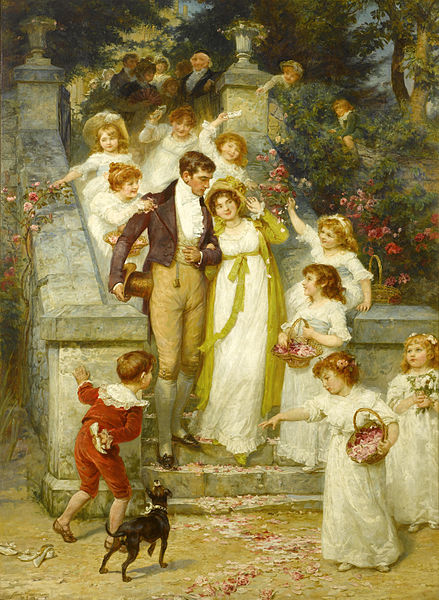I struggle as a Mom. Some days I feel like the entire day is spent encouraging, lecturing, threatening, and punishing kids into applying the Golden Rule: Do unto others as you would have them do unto you. Knowing my goal is not tyrannical subjugation, but rather a “disposition of reciprocal openness and autonomy together,” I’ve tried every analogy under the sun. The one I use most frequently is that as a family, we are all part of the same team (our younger kids have been around team sports a lot more than they’ve studied anatomy). As a team, we celebrate each other’s victories, because, well, they are victories for all of us. And we mourn each other’s losses because, well, they are our losses too. And most importantly, we build up, we do not tear down. When we build one another up, we are building up the entire team. When we tear down, we are harming the entire team (i.e. the family).
At times, this is easier said than done, given the wide variety of personalities in our home. But apparently, our home is not alone in this struggle. G.K. Chesterton once said,
“The best way that a man could test his readiness to encounter the common variety of mankind would be to climb down a chimney into any house at random, and get on as well as possible with the people inside. And that is essentially what each of us did on the day that he was born.
This is, indeed, the sublime and special romance of the family. It is romantic because it is a toss-up.” – Brave New Family, p. 43
Of course that’s true. For when you think about it, families can be composed of individuals who would never choose to live in the same hemisphere, much less in the same home! In The Birth Order Book, Kevin Leman says that if a family is a tree, the children are the branches – and of course, branches grow in all different directions. In fact, Leman says,
“One of the best predictions in life is that whatever the firstborn in a family is, the second born in the family will go in a different (and oftentimes opposite) direction.”
What better soil for the organic development of a healthy and robust Body of Christ? For growing in consideration, patience and selfless love?
Of course, if our family is any indication, sometimes I don’t have much hope for the rest of world. In those moments I’m mediating until my tongue is in knots, or separating a couple of rowdy kids because I fear the damage resulting from being together will out-do the damage caused by being apart. In those moments, I question God’s grand plan for the sanctity of the world. In those moments I would give anything just to walk away from the awesome responsibility of raising saints.
But there are others. There are moments — thankfully, many moments — that give me hope. Those moments can only be described as sacred portrayals of God’s Holy Will for all of mankind. When one notices a slight, and goes out of her way to offer comfort and support. When another takes his siblings out for dessert in a restaurant, just because. When one repents harmful behavior and seeks forgiveness; but even more, reconciliation, and there is mercy and acceptance and…love. When they help each other with schoolwork, do a chore without being asked. Write a note. Draw a picture. Say a prayer for a family member. These are moments that offer hope for the future. There are moments of heaven in family life – when all the struggles, sacrifices and suffering have their reward.
Even more importantly, in those moments, our family is a family. It is in those moments what God intended it to be. We are one body, united in the Holy Spirit, pouring ourselves out for one another in love.
If we can become one body within the confines of our own homes, beginning in the confines of our own hearts, than there is hope that we can be one unified body in our communities, in our states, in our country, and throughout the world. And that hope is necessary. Because when I watch the news, read the paper or browse through social media, I see a diseased body, contorted and vulgar in disparagement and hatred, inflicting violence against herself. There is no discourse. There are only cancerous walls full of anger and hatred and inexplicable disdain.
I cannot change the world. I cannot heal the Body of Christ. But I can pour my heart and soul into our own little domestic church, calling upon the Holy Spirit to strengthen the cells of this microcosm of Christ’s Body within our home. By God’s grace, perhaps one day our children might be sent out into the greater Body of Christ, full of strength, probiotic in nature, resilient and immune to the cancers of hate and selfishness. I can keep grasping at those little moments of hope I am privileged to witness every now and then, as my husband and I do our best to infuse our home with the love of Christ, knowing that the infusion is our path to sanctity. Over time, we are bound to witness an increase in the reciprocal openness and autonomy together, that simultaneous intimacy and dignity which comes from the Holy Ghost.
In the end, whatever struggles we endure and whatever sacrifice is necessary, we must persevere. For the family is the only hope for the world, particularly as it applies to the mystical body. As Saint John Paul II said in a 1986 homily,
The family is the “first and vital cell of society”. In its own way it is a living image and historical representation of the mystery of the Church. The future of the world and of the Church, therefore, passes through the family.
Note: If you like what you just read, please share and/or comment below. Also, please “Follow” to receive future posts promoting the virtue of sacrifice.
Art: The Happy Family by Jean Honoré Fragonard, c. 1775







 1
1  2.
2.  3.
3.  4.
4.  5.
5.  6.
6.  Guidance to Heaven begins by making clear the purpose of this life in preparing for eternity. Cardinal Bona will help readers to prepare themselves for death by addressing vices with which many of us struggle, and helping us to bring them under control. The jacket of my book says it all and reads in part,
Guidance to Heaven begins by making clear the purpose of this life in preparing for eternity. Cardinal Bona will help readers to prepare themselves for death by addressing vices with which many of us struggle, and helping us to bring them under control. The jacket of my book says it all and reads in part, 8.
8.  9.
9. 10.
10. 
 Baptism, the outpouring of the Holy Spirit in Confirmation, and the nourishment provided in the Most Holy Eucharist. As God’s people, we reject sin and promise to live a new life of faith in Christ. Indeed, as witnesses of Jesus’ Death and Resurrection, we do what St. Paul urges: “Offer your own bodies as a living sacrifice, holy and pleasing to God… Do not conform yourselves to this age but be transformed by the renewal of your mind, that you may discern what is the will of God, what is good and pleasing and perfect” (Rom 12:1-2).
Baptism, the outpouring of the Holy Spirit in Confirmation, and the nourishment provided in the Most Holy Eucharist. As God’s people, we reject sin and promise to live a new life of faith in Christ. Indeed, as witnesses of Jesus’ Death and Resurrection, we do what St. Paul urges: “Offer your own bodies as a living sacrifice, holy and pleasing to God… Do not conform yourselves to this age but be transformed by the renewal of your mind, that you may discern what is the will of God, what is good and pleasing and perfect” (Rom 12:1-2). es Borromeo Parish in Gretna, Nebraska. Ordained in 2000, Fr. Loseke holds a Licentiate in Sacred Theology (S.T.L.) from the Pontifical Athenaeum of St. Anselm in Rome and is working to complete his doctoral degree (Ed.D.) in interdisciplinary leadership through Creighton University in Omaha. In addition to parish ministry, Fr. Loseke has served as a chaplain in the U.S. Air Force, taught high school theology and college-level philosophy, and has been a presenter for various missions, retreats, and diocesan formation days across the country.
es Borromeo Parish in Gretna, Nebraska. Ordained in 2000, Fr. Loseke holds a Licentiate in Sacred Theology (S.T.L.) from the Pontifical Athenaeum of St. Anselm in Rome and is working to complete his doctoral degree (Ed.D.) in interdisciplinary leadership through Creighton University in Omaha. In addition to parish ministry, Fr. Loseke has served as a chaplain in the U.S. Air Force, taught high school theology and college-level philosophy, and has been a presenter for various missions, retreats, and diocesan formation days across the country.


 fresh and so in love that even folding socks together was fun? Where even an accidental touch was electrifying and you called your love 100 times a day just to hear his voice?
fresh and so in love that even folding socks together was fun? Where even an accidental touch was electrifying and you called your love 100 times a day just to hear his voice?
 e across a poem by Paula Zwenger that really speaks to the subject of sacrifice in a beautiful and inviting way – particularly as it pertains to the vocation of marriage. I wasted no time in asking if she would allow me to post it here. Thankfully she said yes – please enjoy her contribution below:
e across a poem by Paula Zwenger that really speaks to the subject of sacrifice in a beautiful and inviting way – particularly as it pertains to the vocation of marriage. I wasted no time in asking if she would allow me to post it here. Thankfully she said yes – please enjoy her contribution below:

 climbing again; pulling each other up when we fall, sometimes tripping over each other along the way?
climbing again; pulling each other up when we fall, sometimes tripping over each other along the way?
 honeymoon. Or at least that’s how it was 21 years ago when I got married. Could be that these days grooms are getting overwhelmed and brides are looking forward to the honeymoon (I did hear the term “
honeymoon. Or at least that’s how it was 21 years ago when I got married. Could be that these days grooms are getting overwhelmed and brides are looking forward to the honeymoon (I did hear the term “